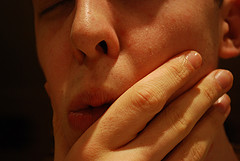
 It’s one of the most common and most painful cancer-treatment side effects: mouth sores. You may be rinsing with salt water, but is there anything else you can do to prevent these things, or at least alleviate the pain?
It’s one of the most common and most painful cancer-treatment side effects: mouth sores. You may be rinsing with salt water, but is there anything else you can do to prevent these things, or at least alleviate the pain?
Since mouth sores can affect how much you eat, and in severe cases, even lead to malnutrition, we gathered some information to help you deal with them. Try these steps to lower your risk, avoid making them worse, and relieve the pain.
To prevent it:
- Go to your dentist for a thorough checkup before starting cancer treatment.
- Brush teeth, floss, and use a non-alcohol mouth rinse twice a day.
- Keep your mouth and lips moist and hydrated.
To treat it:
- Ask your dentist about pain-relieving mouth rinses.
- Try a numbing gel like Ora-Gel on the sore itself.
- “Prevention” magazine recommends making your own rinse by combining Maalox with Benadryl.
- Floss once a day. (If you’re gums are bleeding or you’re just bleeding easily in general, check with your doctor or dentist before flossing.)
- Try a water irrigator at a low level to get all the food out between teeth. You can also add salt or an anti-bacterial mouthwash to the water for extra cleaning.
- Use a soft toothbrush or ask your dentist for a foam one if your mouth is extra sensitive.
- Use lip balm regularly to keep lips moist-dry lips make it easier for germs to get inside your mouth.
- Drink plenty of water to keep the inside of the mouth hydrated. If you have dry mouth, consider chewing sugarless gum or sucking on hard candies-sugar-free if possible.
- Suck on ice cubes or popsicles to numb the painful area between meals and-if you’re having trouble eating-before meals.
To eat with it:
- Eat soft foods like pasta, cottage cheese, yogurt, ice cream or frozen yogurt (less sugar and fat), soft fruits, and shakes, and cook your veggies to soften them up.
- Stay away from alcohol as it irritates the inside lining of the mouth-purchase alcohol-free mouthwashes.
- Avoid acidic foods like citrus fruits, tomatoes, spicy foods, or rough-textured foods that will be harder to eat. Chips, popcorn, some dry cereals, and fried food will be difficult-choose pasta, food cooked in sauce, bananas, soft casseroles, eggs, gravy-covered items, soups, and custards.
- Cut food up into smaller pieces so you don’t have to chew so much.
- Use a straw to drink, and a small spoon to reduce the amount of each mouthful.
Do you have some tips for dealing with mouth sores? Please share.
Photo courtesy stuartpilbrow via Flickr.com.

